Future-proof tech skills are the compass for navigating today’s fast-changing digital landscape, guiding career decisions and learning strategies for students, freelancers, and professionals alike. Developing these competencies helps you grow with the work, staying ahead in the realm of in-demand tech skills and preparing for digital skills that stay relevant across industries and roles, and aligning with your career paths. This guide outlines how to identify durable skills, combine curiosity with practical projects, and pursue upskilling for tech careers that translate into measurable real-world impact and long-term value across multiple domains and technology stacks. By focusing on transferable foundations—problem solving, systems thinking, and adaptable coding—professionals can safeguard skills for future job security while remaining versatile in changing teams and platforms, tools, and process flows. Investing today in these durable capabilities helps you adapt across sectors, boosting resilience and expanding opportunity as technology evolves and new workflows emerge to support innovation and business outcomes.
Equally important is cultivating transferable tech competencies that endure beyond any single platform, such as resilient digital skills, scalable architectures, and problem-solving agility. Seen through an LSI lens, the topic also encompasses ongoing learning, cross-functional collaboration, cloud literacy, cybersecurity basics, data fluency, and the ability to translate business needs into technical solutions. Rather than chasing a specific tool, focus on adaptable mastery—conceptual foundations, systematic experimentation, and the mindset of continual improvement. These long-term capabilities map to durable career trajectories, enabling data-informed decision-making, ethical automation, and resilient performance across roles and industries.
Future-proof tech skills: Building a durable, adaptable technical foundation
Future-proof tech skills are not about memorizing a single tool but about mastering transferable competencies that endure as technology shifts. Core foundations in computer science, algorithms, and systems thinking remain valuable across domains, while learnability and adaptability allow you to pivot to new languages and platforms. By combining technical depth with the ability to articulate problems and collaborate, you create a durable toolkit that stays relevant in any role.
Durable domains such as cloud computing, cybersecurity, data literacy, and DevOps practices persist as core areas of demand. This aligns with the concept of in-demand tech skills that stay relevant. For example, cloud architects, data analysts, and security engineers are needed across industries; data literacy helps teams turn data into decisions; and AI/automation literacy enables teams to use intelligent tools without vendor lock-in. These durable domains embody digital skills that stay relevant as tools and workflows evolve.
Developing in-demand tech skills and a practical upskilling plan for tech careers
To operationalize upskilling for tech careers, adopt a practical, lifelong-learning mindset. Start with a foundation of programming, data structures, networks, and systems thinking, then expand into cloud services, automation, and security. This approach emphasizes digital skills that stay relevant by focusing on fundamentals that scale across languages and tools, rather than chasing every new trend.
Plan a concrete, 12-month roadmap that balances breadth with depth. Include hands-on projects, open-source contributions, and portfolio milestones; combine certifications with demonstrable impact; and tailor learning to your industry. This strategy builds the in-demand tech skills you need, supports skills for future job security, and ensures you’re practicing upskilling for tech careers in a way that translates to real business value.
Frequently Asked Questions
What are Future-proof tech skills and why are they important for long-term tech careers?
Future-proof tech skills are transferable, durable capabilities that stay relevant even as tools and platforms change. They combine strong fundamentals (problem solving, algorithms, and coding discipline) with learnability and collaboration. Examples include cloud computing, cybersecurity, data literacy, DevOps, and AI/automation literacy. These skills help you adapt across roles and industries and enable ongoing growth through practice and learning.
How can I develop and apply Future-proof tech skills through practical upskilling for tech careers?
To build and apply Future-proof tech skills, follow a practical, ongoing plan: strengthen fundamentals in CS concepts, data structures, and systems thinking; adopt lifelong learning with hands-on projects and code reviews; pursue real-world projects or open-source work to demonstrate impact; balance certifications with work experience; tailor your upskilling to your domain and career goals; develop complementary soft skills like communication and collaboration. A simple 12-month roadmap can guide your progress, starting with fundamentals and cloud basics, then cloud services, data literacy, DevOps, and finally delivering a portfolio project that proves impact.
| Key Topic | Overview |
|---|---|
| Future-proof concept | Focus on transferable competencies, learnability, adaptability, and problem-solving; not about mastering a single language or tool. |
| Durable domains & in-demand skills | Cloud computing, cybersecurity, data literacy, and software engineering practices; includes systems design and architecture thinking; AI/automation literacy. |
| Beyond coding | Emphasizes transferable skills like systems thinking, collaboration, and communication alongside technical depth. |
| Practical upskilling | Foundation building, lifelong learning, practical projects, balanced certifications with experience, domain-aligned planning, and soft skills. |
| 12-month roadmap | Quarterly focus areas: fundamentals; cloud/services and security; data literacy; DevOps and AI; portfolio project; ongoing learning plan. |
| Career relevance | Resilience in career, easier domain switches, collaboration across teams, and protection against obsolescence as digital initiatives accelerate. |
| Practical workflow | Inventory skills, plan learning projects, share knowledge, track progress, and reassess industry trends. |

